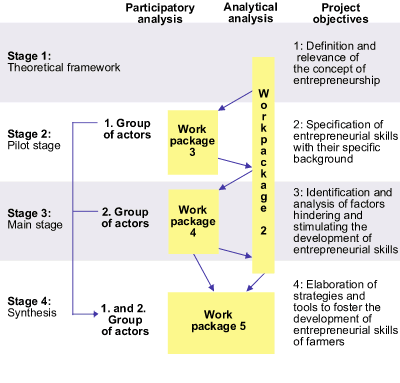Work plan
As an overall methodology, the project will pursue an approach that combines analytical top down analysis with bottom up participatory and qualitative research.
The project will consist of a four-stage process which includes a total of four work packages.
- Stage: Development of a theoretical framework for the definition of entrepreneurship and entrepreneurial skills
- Stage: Pilot stage of the analytical and participatory analysis
- Stage: Main stage of the analytical and participatory analysis
- Stage: Synthesis
The structure of the project
The figure shows the structure of the project

In the first stage a theoretical segmentation framework for the definition of entrepreneurship and entrepreneurial skills will be developed. This means that farmers are categorised in a standard way by different criteria in order to provide a gap analysis of the core skills which farmers have and the skills and support which they need in order to become more entrepreneurially successful. Stage 1 addresses objective 1 of the project.
In the second stage, pilot stage, the concept of agricultural entrepreneurship will be outlined with relevant actors and the segmentation framework will be tested.
In every partner country, the concept of entrepreneurial skills will be discussed with experts from the socio-technical network of agriculture. The aim is to specify entrepreneurial skills with their social, economic, political and cultural background from a national point of view (project objective 2). The results will be used to improve the segmentation framework of stage 1 and to ensure an effective in-depth analysis in stage 3.
The third stage corresponds to the main stage of the study. It addresses project objective 3.
In every partner country a case study region will be selected (Table 1). On the basis of the improved segmentation framework and the results from stage 2, the concept of agricultural entrepreneurship will be examined in detail and the economic, social and cultural factors hindering or stimulating the development of entrepreneurial skills of farmers will be analysed in the selected case study regions. The case study approach is selected to ensure the possibility of an in-depth analysis and initiate a change in the awareness of farmers concerning entrepreneurship and entrepreneurial skills.
The results will be used to complete the segmentation framework.
Participating countries for the selection of case study regions:
| Participating countries | Responsible partner |
|---|---|
| Switzerland | FiBL |
| United Kingdom | UL |
| Finland | UHEL |
| The Netherlands | PPO |
| Poland | RIPF |
| Italy | UWC |
The synthesis (forth stage) is dedicated to the implementation of the insights of the other work packages. The synthesis will continue and consolidate the work of previous work packages with farmers and other relevant actors by elaborating strategies to foster the development of entrepreneurial skills with a participatory approach. For this, a workshop in the same case study regions as in stage 3 will be organised with the same actors as in stage 2 and 3. The participation of the experts from stage 2 ensures the enhancement of insights from the case studies to national recommendations.
The national results will be consolidated and recommendations formulated during an EU-seminar with all partners and the project advisory board. Then a diagnostic tool will be elaborated with which farmers can evaluate the strategic orientation of their farming and the strengths and weaknesses of their entrepreneurial skills in relation to the defined strategic orientation. The bases for the tool are the segmentation model from stage 1 and the skill set of stage 2 and 3.
 This website was archived on February 10, 2016 and is no longer updated.
This website was archived on February 10, 2016 and is no longer updated.
